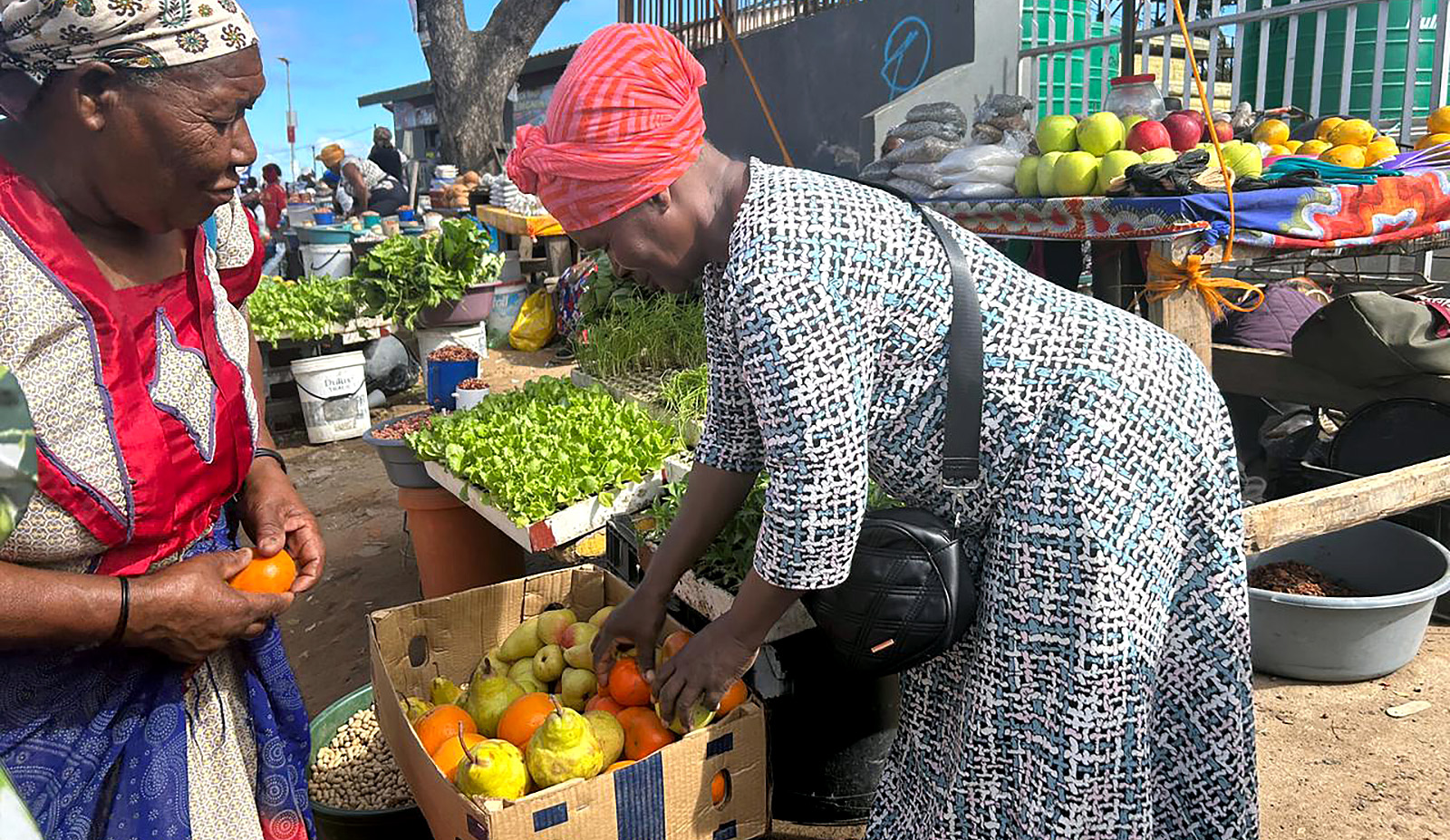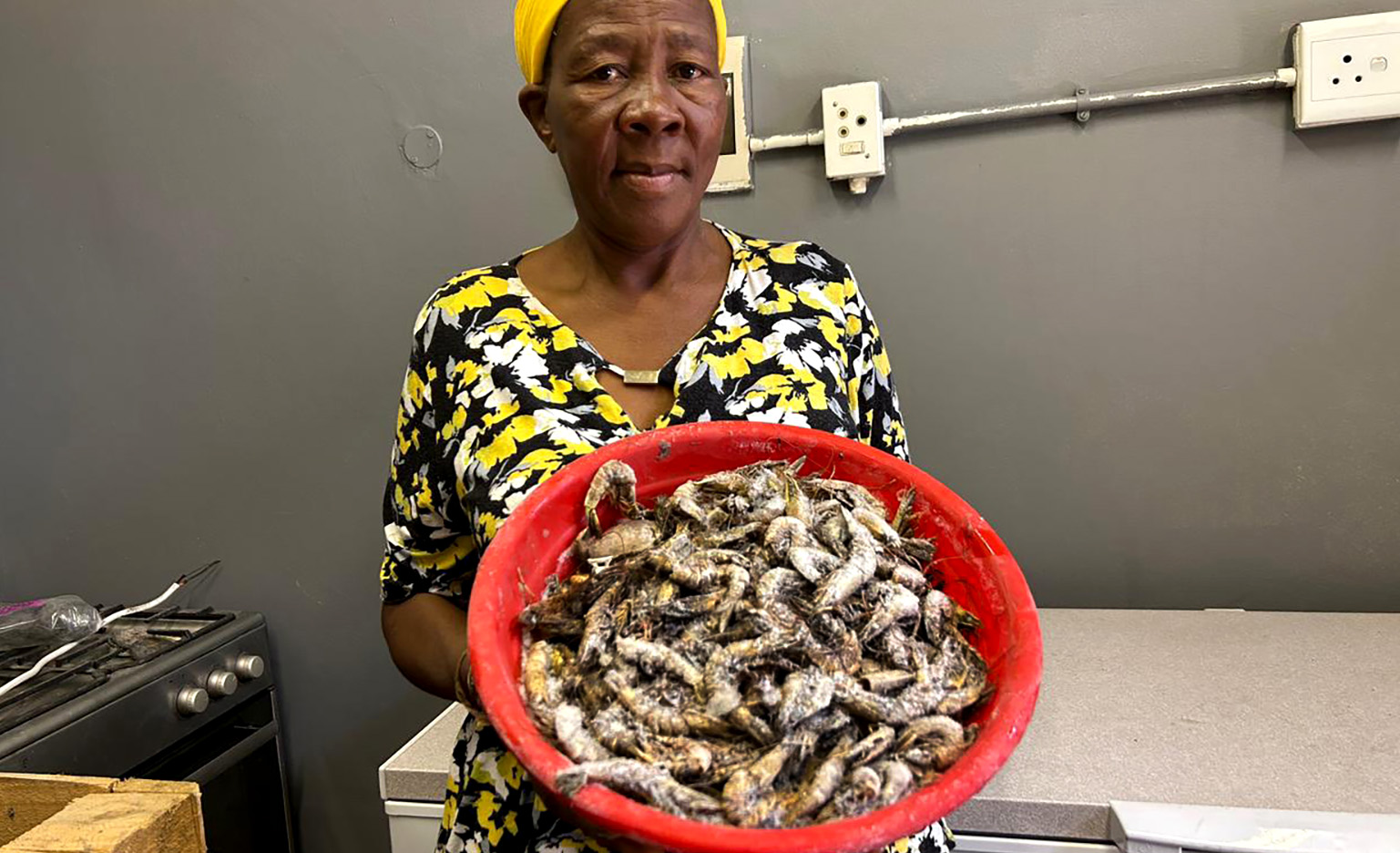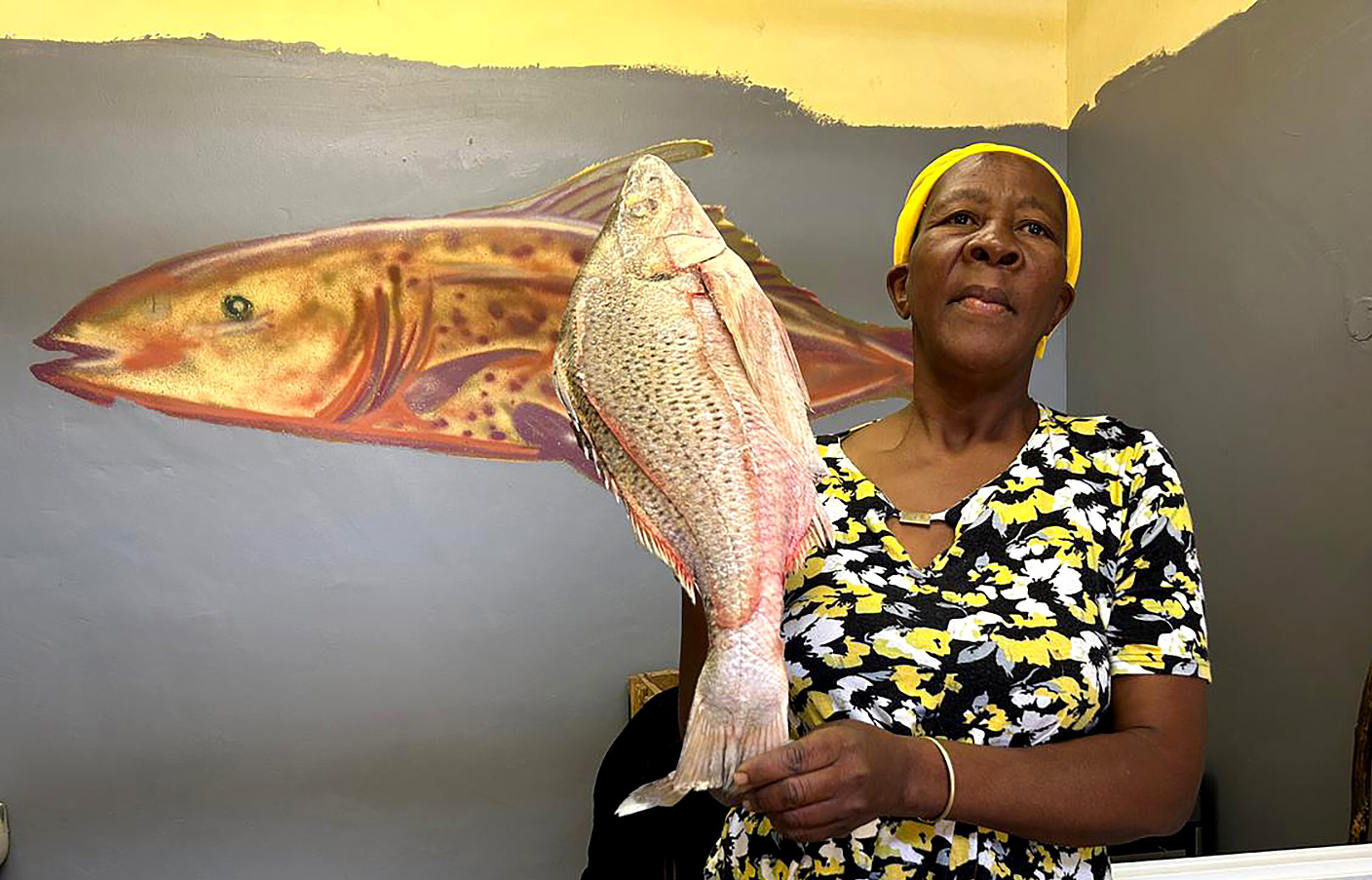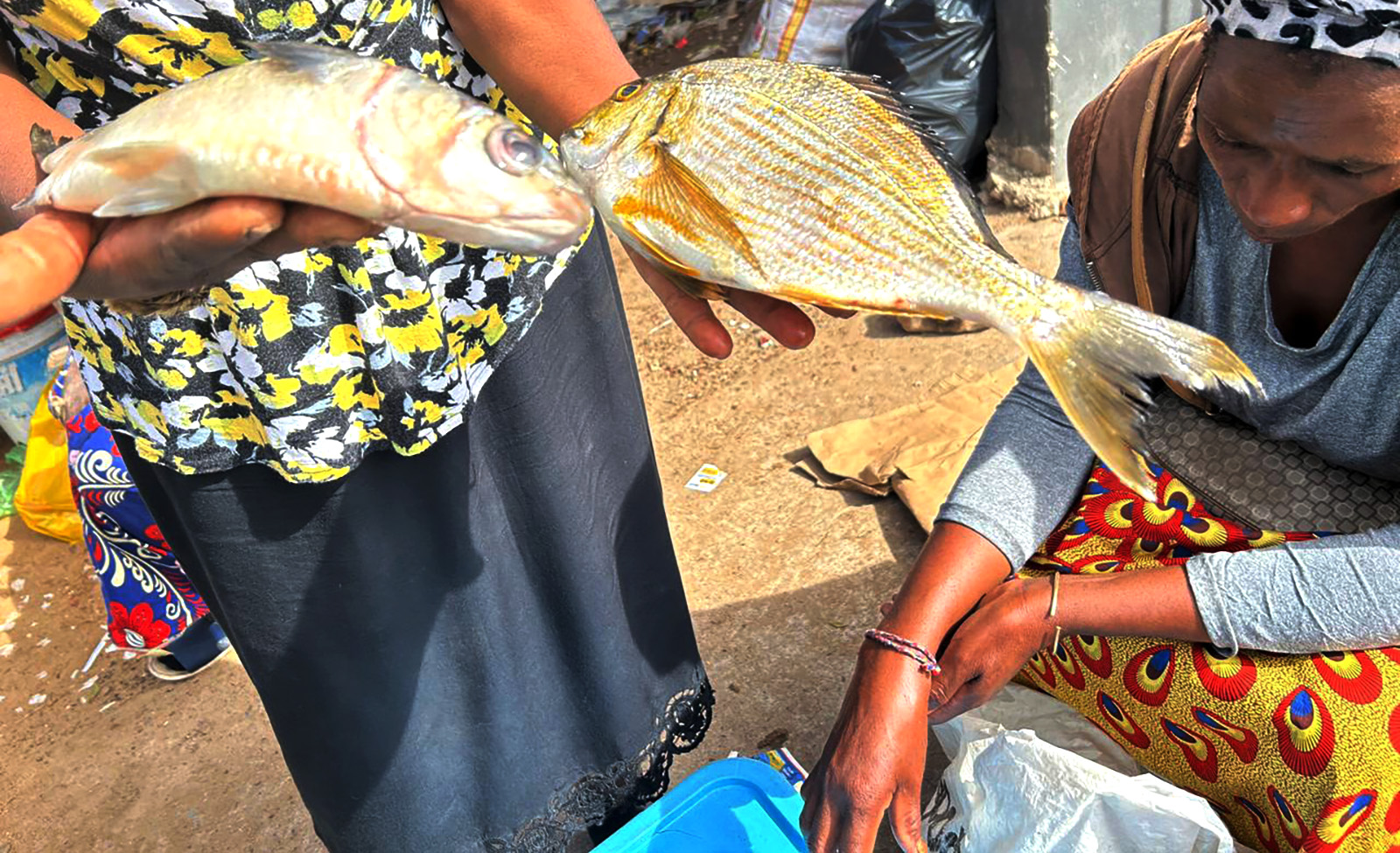Thoko Ntimbane (58), a small-scale fisher in Kosi Bay, KwaZulu-Natal, holds up a 4kg spotted grunter that is about 40cm long. Beaming, she talks in detail about the species and others that she catches.
Ntimbane goes to great lengths to catch these fish. A fishing day starts at 4am. She walks for two hours to get to the coast and crosses through bushes to get to her fishing spot.
Depending on her catch of the day from straight-line fishing, she could be carrying anything from 15-35kg back home.
But this is not her biggest challenge on fishing days, as she can be arrested if she’s found with the wrong species, fish that are too small, or if she has crossed over into the Marine Protected Area (MPA).
“We have lost the sea. We have no water with life that we can touch now. Unemployment is already high in Kosi Bay, and we have a lot of crime as a result. Fishing is one of the last ways we have to make money, it is the only way right now,” Ntimbane said.
Kosi Bay is part of the iSimangaliso Wetland Park World Heritage Site. It is about a five-hour drive from Durban. The Mozambique border forms the northern boundary of the MPA and the Indian Ocean the eastern boundary.
Despite being granted fishing rights, small-scale fishery (SSF) cooperatives face obstacles in exercising them because of restricted access to water bodies and limitations imposed by MPAs.
 Women also sell fresh fruit and herbs in the little market formed by the roadside in Kosi Bay, KwaZulu-Natal. (Photo: Zukiswa Pikoli)
Women also sell fresh fruit and herbs in the little market formed by the roadside in Kosi Bay, KwaZulu-Natal. (Photo: Zukiswa Pikoli)
Compound threats to livelihoods
Estuary management plans, limitations due to working in MPAs, and now concerns around oil and gas developments in the sea are ongoing challenges for small-scale fishers.
According to MPA regulations, only subsistence fishing is allowed and it’s limited to personal consumption. Fishers are limited to straight-line fishing and butterfly net fishing.
Ntimbane’s daughter, Nompilo Ntimbane (28), also a fisher, said: “The challenge is when we get to the water, we are not allowed even when we have a permit. The people from Nature (nature conservation officers) have their way of thinking, [but] straight-line fishing and butterfly [net] fishing make it hard to get fish.
“We used to use fish kraals in high seasons for grunters and stumpnose but we can’t use that due to the regulations. If we were allowed to use the gillnets we could come back with the fish the customers want,” said Nompilo, who is part of the cooperative Inhloso YamaKhosikazi.
The concern from the Department of Fisheries and conservation experts over gillnets is that they catch everything, including species that are at high risk, and undersized fish.
Read more in Daily Maverick: Lake St Lucia fishers – ‘We just want to fish. Why are they killing us?’
Ntimbane says the nets can be created so that smaller fish pop through the mesh and back into the water. Communities have used this method for more than a century.
Ntimbane catches grunter, kingfish, rock salmon, red snapper and yellowfin bream. She is a third-generation fish farmer — her father and grandfather were fishers and passed on the traditional methods of fishing she uses today to sustain herself and her family.
She has educated two children through the income she earned from fishing, but notes that this has become a sore point for her community, where many young adults are unemployed.
“Two of my children went to tertiary [education] from the money I made from fishing, selling the fish fresh or preparing it for them in my kitchen,” Ntimbane said.
Nompilo Ntimbane has a diploma in Tourism Management, but after her in-service training, she hasn’t been able to get a job, making the success of the fishing venture even more crucial to her.
“Mom has taught us a lot, she is always trying. We have this kitchen, she also makes arts and crafts for tourists and I am now looking into selling bottled chilli sauce to create an income,” Nompilo said.
 Prawns that small-scale fisher Thoko Ntimbane sometimes uses as bait to catch species such as rock salmon and grunter in Kosi Bay, KwaZulu-Natal. (Photo: Zukiswa Pikoli)
Prawns that small-scale fisher Thoko Ntimbane sometimes uses as bait to catch species such as rock salmon and grunter in Kosi Bay, KwaZulu-Natal. (Photo: Zukiswa Pikoli)
Fishing for survival
Lindani Ngubane is a fishing rights activist and community facilitator for the Masifundise Development Trust.
“People can’t catch fish to eat only, they need to be able to catch fish for trading — they have other needs,” Ngubane said.
“Children need school clothes and school fees and that’s where our idea for the small-scale fishing policy came about. We challenged the department and forced the department to listen to fishers, and we won. We were happy to eat and to sell.”
Wilmien Wicomb from the Legal Resources Centre (LRC) says the policy falls short because regulations in the Marine Living Resources Act (MLRA) forced people into cooperatives. She says that treating cooperatives like corporations doesn’t speak to the intention of the policy, which was for communities to work together.
“The regulations also locked out many other people who are part of the fishing industry … who maybe fillet, cook, fish or make nets, and none of them were recognised. This structure that forces people to be commercial entities didn’t work and left thousands of people out without fishing permits.”
Wicomb says Kosi Bay is in a special position because it’s part of the iSimangaliso Wetland Park Heritage Site, which makes it harder to find a compromise between conservation and allowing communities adequate access to the water.
“The problem is layered. iSimangaliso [management] has always kind of taken the position that these other laws don’t apply there, that they make the rules and that’s it, so for a long time they didn’t care if the Department of Environmental Affairs gave someone a fishing permit, they decided they made the rules and it wasn’t for the department to give people permits around the site.
“In 2017, the fishers went to court asking for clarity because they had permission, but the rangers would show up and say another thing; it would get serious — some people have died. We have tried multiple times to get clarity from iSimangaliso for the fishers,” Wicomb said.
The challenge in iSimangaliso is finding the right balance. Estuary management plans deal only with the protection of parks, river systems and sea. They don’t deal with the impact on fishers and “they didn’t communicate with the community on how they can find a joint solution”, Wicomb said.
The small-scale fishing policy manifests in different ways across the province and the country as a whole. For example, fishers in some places on the West Coast are permitted to use gillnets.
Acknowledging historical dispossession
The abstract from the government’s Policy for the Small-Scale Fisheries Sector in South Africa acknowledges the long history of dispossession in the sector.
 Small-scale fisher Thoko Ntimbane shows a spotted grunter. She uses traditional, sustainable ways to fish in Kosi Bay, KwaZulu-Natal. (Photo: Zukiswa Pikoli)
Small-scale fisher Thoko Ntimbane shows a spotted grunter. She uses traditional, sustainable ways to fish in Kosi Bay, KwaZulu-Natal. (Photo: Zukiswa Pikoli)
“During Colonial times and more recently during the Apartheid era, many traditional fishing communities were dispossessed of their lands adjacent to the coast. In the 1890s, South Africa introduced policy and legislation to establish a fisheries management system. However, this system was aimed mainly at the growing commercial fisheries sector and largely neglected the Small Scale fisheries sector.
“The commercial sector was dominated by wealthy white capital, which from the 1940s onwards was assisted by the range of measures that the Apartheid regime introduced to support the establishment of a flourishing export-oriented commercial fishing industry,” the policy says.
Although Ngubane, Ntimbane and fishers from other communities have pushed to be acknowledged and given fishing rights tailored to the small-scale fishing industry, Ngubane notes that the policy is not a quick fix and will need further work to curb exclusion.
“Fishers need to raise their hands and advocate for themselves — you cannot let the struggle go. The policy was not a silver bullet, more can be done to make sure communities don’t go hungry,” Ngubane said. DM




 Small-scale fisher Thoko Ntimbane shows a spotted grunter. She uses traditional, sustainable ways to fish in Kosi Bay, KwaZulu-Natal. (Photo: Zukiswa Pikoli)
Small-scale fisher Thoko Ntimbane shows a spotted grunter. She uses traditional, sustainable ways to fish in Kosi Bay, KwaZulu-Natal. (Photo: Zukiswa Pikoli) 